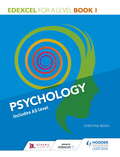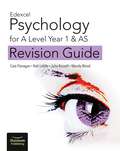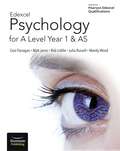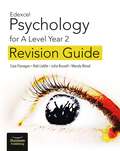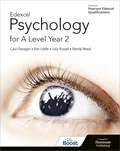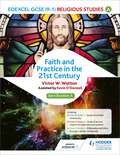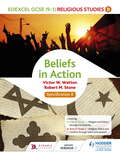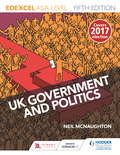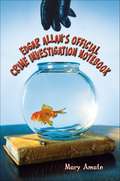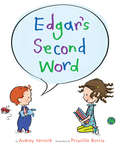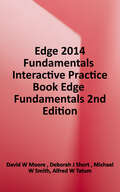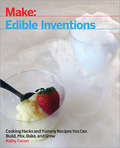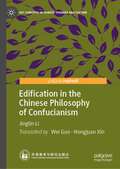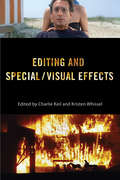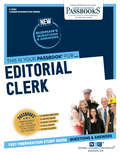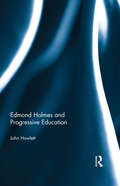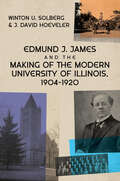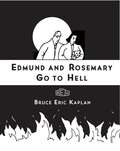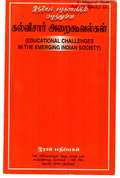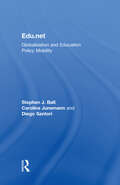- Table View
- List View
Edexcel Psychology for A Level Book 1
by Christine BrainExam Board: EdexcelLevel: AS/A-levelSubject: PsychologyFirst Teaching: September 2015First Exam: June 2016Endorsed for EdexcelDevelop your students' knowledge of the foundations of modern psychological understanding with this detailed textbook for Edexcel AS and A level Psychology, with targeted activities and clear explanations to build practical, mathematical and problem-solving skillsWritten by experienced author and examiner Christine Brain, this AS and year one A level textbook is fully mapped to the new Edexcel specification.- Helps students build their confidence in practical, mathematical and problem-solving skills through well-presented explanations and activities- Develops understanding and helps each student reach their potential with the essential information covered in a clear, logical format, supported by illustrations, questions and extension tasks- Supports you and your students through the new specification, with accessible coverage of all the key areas of Psychology for AS and year one of A level- Encourages your students to develop their interest in Psychology and its applications, with extension tasks and relevant content
Edexcel Psychology for A Level Year 1 & AS: Revision Guide
by Cara Flanagan Julia Russell Rob Liddle Mandy WoodThe portable-sized Revision Guide is ideal for consolidating knowledge both at home for revision, and at school as a lesson-by-lesson summary as the course progresses. / Each topic is covered on one spread helping students get straight to the point. / Description (AO1) is on the left of the spread split into separate segments to aid revision. / Evaluation (AO3) is on the right, each point illustrating the all-important chains of reasoning. / Exam-style questions, including AO2 application questions on concepts and methods, are on every spread providing lots of practice. / Detailed exam advice section is included, with hints and tips offered throughout the book. / Lots of illustrations and the odd corny joke help make it very user-friendly!
Edexcel Psychology for A Level Year 1 and AS: Student Book
by Cara Flanagan Julia Russell Matt Jarvis Rob Liddle Mandy WoodWritten by leading psychology authors, Cara Flanagan, Matt Jarvis, Rob Liddle, Julia Russell and Mandy Wood, this book's engaging visual style and tone will support you through every step of your Year 1 or AS course and help you thoroughly prepare for assessment. // Endorsed by Edexcel offering high quality support you can trust. // Designed to motivate students of all ability levels with a stunning visual style to help you engage with the information. // Each topic is presented on one spread to help you instantly see the whole picture, with description and evaluation clearly separated. // `Apply it' activities provide plentiful opportunities to help you develop and practise your application and research methods skills. // Numerous links are made between topic content and 'Individual Differences' and 'Developmental Psychology'. // Evaluation points relating to 'Issues and Debates' are integrated into every topic spread. // A chapter is dedicated to research methods and practical activities are included in each chapter to prepare you for research methods questions and practical investigations. // Visual summaries help ensure you have a good grasp of the basics. // Lots of exam support throughout to help you understand the assessment objectives and mark schemes, and guide you on the skills you need for exam success.
Edexcel Psychology for A Level Year 2: Revision Guide
by Cara Flanagan Julia Russell Rob Liddle Mandy WoodThe portable-sized Revision Guide is ideal for consolidating knowledge both at home for revision, and at school as a lesson-by-lesson summary as the course progresses. / Each topic is covered on one spread helping students get straight to the point. / Description (AO1) is on the left of the spread split into separate segments to aid revision. / Evaluation (AO3) is on the right, each point illustrating the all-important chains of reasoning. / Exam-style questions, including AO2 application questions on concepts and methods, are on every spread providing lots of practice. / Detailed exam advice section is included, with hints and tips offered throughout the book. / Lots of illustrations and the odd corny joke help make it very user-friendly!
Edexcel Psychology for A Level Year 2: Student Book
by Cara Flanagan Julia Russell Matt Jarvis Rob Liddle Mandy WoodWritten by leading psychology authors, Cara Flanagan, Matt Jarvis, Rob Liddle, Julia Russell and Mandy Wood, this book's engaging visual style and tone will support you through every step of your A Level Year 2 course and help you thoroughly prepare for assessment. // Endorsed by Edexcel offering high quality support you can trust. // Designed to motivate students of all ability levels with a stunning visual style to help you engage with the information. // Each topic is presented on one spread to help you instantly see the whole picture, with description and evaluation clearly separated. // `Apply it' activities provide plentiful opportunities to help you develop and practise your application and research methods skills. // Numerous links are made between topic content and 'Individual Differences' and 'Developmental Psychology'. // Evaluation points relating to 'Issues and Debates' are integrated into every topic spread. // A chapter is dedicated to research methods and practical activities are included in each chapter to prepare you for research methods questions and practical investigations. // Visual summaries help ensure you have a good grasp of the basics. // Lots of exam support throughout to help you understand the assessment objectives and mark schemes, and guide you on the skills you need for exam success.
Edexcel Religious Studies for GCSE (9-1) (9-1): Catholic Christianity (Specification A): Faith and Practice in the 21st Century
by Victor W. WattonExam Board: EdexcelLevel: GCSESubject: Religious StudiesFirst Teaching: September 2016First Exam: June 2018Endorsed for Edexcel Trust Victor Watton to maximise every student's potential with his trademark mix of well-paced, focused content coverage and confidence-boosting exam support tailored to the 2016 Edexcel requirements.- Progressively builds students' subject knowledge through accessible explanations of religious and thematic concepts, topics and terms- Helps students learn, retain and revise the key content by following a clear and consistent structure that maps every topic against the specification- Offers a complete solution to assessment preparation with practice questions and expert guidance on how students can improve their responses- Enhances students' interest and understanding using a variety of engaging visual sources, textual extracts and activities to illustrate different practices, perspectives and teachingsEdexcel GCSE RS Spec A: Faith and Practice in the 21st CenturyContent covered:- Area of study 1: Study of religion - Catholic Christianity - Area of study 2: Study of second religion -Islam and Judaism - Area of study 3: Philosophy and ethics- Covers the short course content for Catholic Christianity and Islam or Judaism
Edexcel Religious Studies for GCSE (9-1): Beliefs in Action (Specification B)
by Robert M. Stone Victor W. WattonEndorsed for EdexcelTrust Victor Watton to maximise every student's potential with his trademark mix of well-paced, focused content coverage and confidence-boosting exam support; tailored to the 2016 Edexcel requirements and brought to you by the market-leading Religious Studies publisher.- Progressively builds students' subject knowledge through accessible explanations of religious and thematic concepts, topics and terms- Helps students learn, retain and revise the key content by following a clear and consistent structure that maps every topic against the specification- Offers a complete solution to assessment preparation with practice questions and expert guidance on how students can improve their responses- Enhances students' interest and understanding using a variety of engaging visual sources, textual extracts and activities to illustrate different practices, perspectives and teachingsEdexcel GCSE RS Spec B: Beliefs in ActionContent covered:Area of study one: Religion and ethics through a study of ChristianitySection 1 Christian beliefsSection 2 Marriage and the familySection 3 Living the Christian LifeSection 4 Matters of Life and DeathArea of study two: Religion, Peace and Conflict through a study of Islam and JudaismSection 1 Muslim beliefsSection 1 Jewish beliefsSection 2 Crime and PunishmentSection 3 Living the Muslim LifeSection 3 Living the Jewish LifeSection 4 Peace and conflict- Covers the short course content (through Christianity and Islam or Judaism)
Edexcel Religious Studies for GCSE (9-1): Beliefs in Action (Specification B)
by Robert M. Stone Victor W. WattonExam Board: EdexcelLevel: GCSESubject: Religious StudiesFirst Teaching: September 2016First Exam: June 2018Endorsed for EdexcelTrust Victor Watton to maximise every student's potential with his trademark mix of well-paced, focused content coverage and confidence-boosting exam support tailored to the 2016 Edexcel requirements.- Progressively builds students' subject knowledge through accessible explanations of religious and thematic concepts, topics and terms- Helps students learn, retain and revise the key content by following a clear and consistent structure that maps every topic against the specification- Offers a complete solution to assessment preparation with practice questions and expert guidance on how students can improve their responses- Enhances students' interest and understanding using a variety of engaging visual sources, textual extracts and activities to illustrate different practices, perspectives and teachingsEdexcel GCSE RS Spec B: Beliefs in ActionContent covered:Area of study one: Religion and ethics through a study of ChristianitySection 1 Christian beliefsSection 2 Marriage and the familySection 3 Living the Christian LifeSection 4 Matters of Life and DeathArea of study two: Religion, Peace and Conflict through a study of Islam and JudaismSection 1 Muslim beliefsSection 1 Jewish beliefsSection 2 Crime and PunishmentSection 3 Living the Muslim LifeSection 3 Living the Jewish LifeSection 4 Peace and conflict- Covers the short course content (through Christianity and Islam or Judaism)
Edexcel Religious Studies for GCSE (9-1): Faith and Practice in the 21st Century
by Victor W. WattonTrust Victor Watton to maximise every student's potential with his trademark mix of well-paced, focused content coverage and confidence-boosting exam support; tailored to the 2016 Edexcel requirements and brought to you by the market-leading Religious Studies publisher.- Progressively builds students' subject knowledge through accessible explanations of religious and thematic concepts, topics and terms- Helps students learn, retain and revise the key content by following a clear and consistent structure that maps every topic against the specification- Offers a complete solution to assessment preparation with practice questions and expert guidance on how students can improve their responses- Enhances students' interest and understanding using a variety of engaging visual sources, textual extracts and activities to illustrate different practices, perspectives and teachingsEdexcel GCSE RS Spec A: Faith and Practice in the 21st CenturyContent covered:- Area of study 1: Study of religion - Catholic Christianity - Area of study 2: Study of second religion -Islam and Judaism - Area of study 3: Philosophy and ethics- Covers the short course content for Catholic Christianity and Islam or Judaism
Edexcel UK Government and Politics for AS/A Level Fifth Edition
by Neil McnaughtonTrusted author Neil McNaughton brings you his bestselling politics textbook, fully updated and endorsed for the 2017 Edexcel specification. Topical coverage includes the June 2017 election results and analysis of Brexit politics.Detailed coverage of relevant political developments will build students' knowledge and help them develop a critical understanding of UK government and politics today.- Learn how UK governmental and political history has shaped current events and thinking- Understand the connections between different A-level topics with the new Synoptic Links feature- Clarify understanding of political language with summaries and explanations of key terms- Develop key analysis and evaluation skills with practice questions tailored to the new A-level
Edgar Allan's Official Crime Investigation Notebook
by Mary AmatoFirst Slurpy is fishnapped, then other things from Mrs. Blackwell's room start to disappear. Odder still, whoever is committing these crimes leaves a note written in poetry. Edgar has it all covered in his "crime investigation notebook"--but so does Patrick Chen, who has copied Edgar and is trying to solve the case first. Yet as Edgar keenly observes his surroundings, he notices many interesting things about his classmates. The more closely he watches two "suspects," the more he begins to think they might make pretty good friends. This warm and humorous story puts writing, friendship, and mystery into a short, accessible chapter book.
Edgar's Second Word
by Priscilla Burris Audrey VernickHazel can’t wait for her baby brother to be born so she can talk and read with him! But when, at last, he arrives, he just sits there. More disappointing yet, when he finally speaks, his first word is a resounding NO! But Hazel resolves to wait some more—despite the ever-increasing NOs—and she keeps on reading aloud to him. Will Edgar ever say anything else? And if he does, what will his second word be? The magic of sharing books is at the center of this hilarious new baby story that will resonate with book lovers and any child who has trouble waiting.
Edge
by Diane TullsonSometimes a good kid is drawn into a bad crowd. Sometimes a bad crowd goes over the edge. Even with friends, high school can be a nightmare. But without them, a person's just prey for those who live to torment the unpopular. That's why Marlie Peters is relieved when she's invited to hang out with a new group of people - even if they are all outcasts like her. Together, at least, they make a less vulnerable target. A few people in her new crowd seem okay, but soon the others begin to scare her. Sick of being tormented and bullied, they've decided to get back at the rest of the school by playing a vicious practical joke. Marlie doesn't find the joke at all funny, but even worse, she suspects the punch line could be deadly. Scared, but reluctant to turn on her new friends, Marlie must find the strength to stand alone and stop a horrible tragedy from happening.
Edge 2014 Fundamentals: Interactive Practice Book (Edge Fundamentals)
by Michael W. Smith Deborah J. Short David W. Moore Alfred W. TatumInteractive reading selections, ample practice with vocabulary, reading and literary analysis skills.
Edible Inventions: Cooking Hacks and Yummy Recipes You Can Build, Mix, Bake, and Grow
by Kathy CeceriBelieve it or not, there's a lot of inventing going on in the kitchen. Unless you only eat fruits and veggies right off the plant, you are using tools and techniques invented by humans to make food more tasty and easier to digest. When you cook food, you start to break it down into a form your body can absorb. When you add chemicals to make it thicker, gooey-er, or puffy-er, you turn a bunch of boring ingredients into a mouth-watering snack. Edible Inventions: Cooking Hacks and Yummy Recipes You Can Build, Mix, Bake, and Grow will show you some unusual ways to create a meal, and help you invent some of your own. Projects include:3D printing with foodChemical cuisine and molecular gastronomyPrepared foods like jellies and pickles at homeGrowing your own ingredientsCooking off the grid
Edie's Ensembles
by Ashley SpiresEdie is known for her great outfits and stylish flair. She and her best friend Andrew spend a lot of time playing dress-up. The school hall is their runway. Edie loves the compliments and whispers of admiration, so much so that she begins dressing in increasingly outrageous outfits to get even more attention. No outfit is too bizarre, no costume too flamboyant for Edie. She's so busy coming up with her newest eye-catching ensemble that she doesn't even have time for Andrew anymore ... until one day Edie creates an outfit so weird and so big and bulky that she gets stuck in the doorway. Will anyone notice that this budding fashionista is in trouble?
Edification in the Chinese Philosophy of Confucianism (Key Concepts in Chinese Thought and Culture)
by Jinglin LiThis pivot focuses on “the concept of edification” in a bid to systematically expound its connotative structure and logical evolution. It is divided into ten chapters, embracing various issues, such as human nature as the foundation of edification, the development of edification and cultivation, the evolution of edification and the resultant life based on ritual and music, the political orientation and ultimate care of edification, and the nurturing of social edification, in an effort to offer a panoramic view of the intellectual features of Confucianism, and consequently a profound reflection on the cultural consciousness of contemporary China. The book is expected to satisfy the needs for a better understanding of edification as a Confucian concept, and the conceptual features of Chinese philosophy, or rather, Confucianism.
Editing and Special/Visual Effects
by Kristen Whissel Dana Polan Ariel Rogers Scott Higgins Julie Turnock Tanine Allison Paul Monticone Dan North Professor Deron Overpeck Benjamin Wright Meraj Dhir Lisa Purse Professor Charlie KeilMost moviegoers think of editing and special effects as distinct components of the filmmaking process. We might even conceive of them as polar opposites, since effective film editing is often subtle and almost invisible, whereas special effects frequently call attention to themselves. Yet, film editors and visual effects artists have worked hand-in-hand from the dawn of cinema to the present day. Editing and Special/Visual Effects brings together a diverse range of film scholars who trace how the arts of editing and effects have evolved in tandem. Collectively, the contributors demonstrate how these two crafts have been integral to cinematic history, starting with the "trick films" of the early silent era, which astounded audiences by splicing in or editing out key frames, all the way up to cutting-edge effects technologies and concealed edits used to create the illusions. Throughout, readers learn about a variety of filmmaking techniques, from classic Hollywood's rear projection and matte shots to the fast cuts and wall-to-wall CGI of the contemporary blockbuster. In addition to providing a rich historical overview, Editing and Special/Visual Effects supplies multiple perspectives on these twinned crafts, introducing readers to the analog and digital tools used in each craft, showing the impact of changes in the film industry, and giving the reader a new appreciation for the processes of artistic collaboration they involve.
Editorial Clerk: Passbooks Study Guide (Career Examination Series)
by National Learning CorporationThe Editorial Clerk Passbook® prepares you for your test by allowing you to take practice exams in the subjects you need to study. It provides hundreds of questions and answers in the areas that will likely be covered on your upcoming exam, including but not limited to: Spelling; English grammar and usage; Punctuation; Proofreading; Understanding and interpreting written material; and more.
Edmond Holmes and Progressive Education
by John HowlettAlthough considered a figure of great importance and influence by his contemporaries, Edmond Holmes has been consigned to relative obscurity in the progressive educational tradition. This book reinstates Holmes as a key figure in the history of progressive education, both as a school inspector and educational thinker, who was instrumental in forming a set of ideas and principles which continue to resonate in education today. Combining biographical detail and key critical analysis, Edmond Holmes and Progressive Education brings together the key ideas and aspects of Holmes’ life and establishes his writings as amongst the most insightful ever produced by an educationalist. Throughout his inspectorial career, Holmes scorned mechanical obedience in the classroom and was appalled by the inability of teachers to allow pupils to express themselves freely and imaginatively. His seminal publications positioned him at the vanguard of educational reforms. His work, however, was not exclusively educational, and throughout his life Holmes published on religion, philosophy, poetry and literature, subsuming his educational viewpoint into a much wider ‘philosophy of life’. His spiritual leanings and call for an improved education system, which would draw out the potential for development from within the child, inspired successive generations of progressive educators. In studying Edmond Holmes in detail, this book makes an important contribution to current debates surrounding creativity and the curriculum, in particular, the need for alternative educational voices within the state system of regulation. This book will be key reading for postgraduate students and researchers who are interested in progressive education, the history of education and educational policy and politics.
Edmond Holmes and Progressive Education
by John HowlettAlthough considered a figure of great importance and influence by his contemporaries, Edmond Holmes has been consigned to relative obscurity in the progressive educational tradition. This book reinstates Holmes as a key figure in the history of progressive education, both as a school inspector and educational thinker, who was instrumental in forming a set of ideas and principles which continue to resonate in education today. Combining biographical detail and key critical analysis, Edmond Holmes and Progressive Education brings together the key ideas and aspects of Holmes’ life and establishes his writings as amongst the most insightful ever produced by an educationalist.Throughout his inspectorial career, Holmes scorned mechanical obedience in the classroom and was appalled by the inability of teachers to allow pupils to express themselves freely and imaginatively. His seminal publications positioned him at the vanguard of educational reforms. His work, however, was not exclusively educational, and throughout his life Holmes published on religion, philosophy, poetry and literature, subsuming his educational viewpoint into a much wider ‘philosophy of life’. His spiritual leanings and call for an improved education system, which would draw out the potential for development from within the child, inspired successive generations of progressive educators.In studying Edmond Holmes in detail, this book makes an important contribution to current debates surrounding creativity and the curriculum, in particular, the need for alternative educational voices within the state system of regulation. This book will be key reading for postgraduate students and researchers who are interested in progressive education, the history of education and educational policy and politics.
Edmund J. James and the Making of the Modern University of Illinois, 1904-1920
by J. David Hoeveler Winton U SolbergIn 1904, Edmund J. James inherited the leadership of an educational institution in search of an identity. His sixteen-year tenure transformed the University of Illinois from an industrial college to a major state university that fulfilled his vision of a center for scientific investigation. Winton U. Solberg and J. David Hoeveler provide an account of a pivotal time in the university’s evolution. A gifted intellectual and dedicated academic reformer, James began his tenure facing budget battles and antagonists on the Board of Trustees. But as time passed, he successfully campaigned to address the problems faced by women students, expand graduate programs, solidify finances, create a university press, reshape the library and faculty, and unify the colleges of liberal arts and sciences. Combining narrative force with exhaustive research, the authors illuminate the political milieu and personalities around James to draw a vivid portrait of his life and times. The authoritative conclusion to a four-part history, Edmund J. James and the Making of the Modern University of Illinois, 1904–1920 tells the story of one man’s mission to create a university worthy of the state of Illinois.
Edmund and Rosemary Go to Hell
by Bruce Eric KaplanOne Sunday afternoon, an ordinary couple named Edmund and Rosemary decide to go for a walk in their Brooklyn neighborhood. Within moments, they are plunged into a wonderful, nerve-racking, hilarious, unique adventure that begins with a cell phone and ends in a jungle halfway around the world. In Edmund and Rosemary Go to Hell, famed New Yorker cartoonist Bruce Eric Kaplan uses his trademark incisive wit to explore what it is that prevents us from seeing all that we have. By turns wickedly funny and oddly touching, this provocative and ultimately hopeful picture book for adults will appeal to anyone who has ever been stuck in traffic or, more to the point, stuck inside themselves.
Edu Challenges - Indian Society: இந்தியச் சமுதாயத்தில் எழுந்துள்ள கல்விசார் அறைகூவல்கள்
by Saetiஇந்திய சமுதாயத்தில் எழுந்துள்ள கல்விசார் அறைகூவல்களை, இருபது பாடங்களில் விளக்கி அவற்றை எதிர்கொள்வதற்கான வழிமுறைகளை இருபெரும் ஆசிரியர் கல்வியாளர்கள் இந்நூலில் காட்டுகின்றனர். சென்னைப் பல்கலைக்கழக ஆசிரியர் கல்விப் பாடத்திட்டத்தை ஒட்டி அமைந்ததேனும் பிற பல்கலைக்கழகங்களின் மற்றும் தன்னாட்சிக் கல்வியியல் கல்லூரிகளின் பாடத்திட்டங்கட்கும் ஏற்புடைத்தாகும்.
Edu.net: Globalisation and Education Policy Mobility
by Stephen J. Ball Carolina Junemann Diego SantoriEdu.net builds upon, and extends, a series of research studies of education policy networks and global policy mobilities. It draws on comprehensive data resulting from a Leverhulme Trust research study focused on Africa, and a study funded by the British Academy focused on India, which explored the way in which global actors and organisations bring policy ideas to bear and are joined up in a global education policy network. This timely and cutting-edge new work develops concepts, analyses and methods deployed in Education Plc (2008), Networks, New Governance and Education (2012) and Global Education Inc. (2012). The research is framed by an elaboration of Network Ethnography, an innovative method of policy research. Edu.net presents the substantive findings of the authors’ research by focusing on various kinds of policy movement – people, ideas, practices, methods, money. The book is about both global education policy and ways of researching policy in a global setting. It is an essential read for policy analysts, educational academic researchers and postgraduate education students alike.
